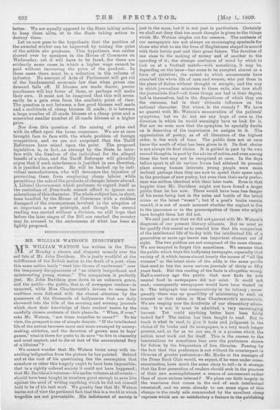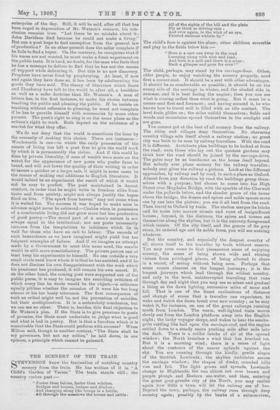MR. WILLIAM WATSON'S INDICTMENT.
MR. WILLIAM WATSON has written in the Times of Monday a sincere and eloquent monody over the sad fate of Mr. John DavidsOn. He is justly wrathful at the indifference Of the British nation to the death of a poet, when this same nation lately "went into throes of excitement" over the temporary disapPearance of "an utterly insignificant and uninteresting young. woman." The comparison is perfectly just. Mr. John Davidson goes down to an unknown grave, and the public—the public, that is, of newspaper readers—is unmoved, while Miss Charlesworth's devices to escape bar creditors were followed with the closest attention by the possessors of the thousands of halfpennies that are daily showered into the tills of the morning and evening journals which show their knowledge of their readers' tastes by the carefully ohosen contents of their placards. "When, if ever," asks Mr. Watson, "are these tragedies to cease " To his view, the prospect is one of simple despair. "If the intellectual life of the nation becomes more and more swamped by money- making, athletics, and the devotion of grown men to boys' games," what is there for poets to do save "to live in obscurity and cruel neglect, and to die at last of the accumulated fury of a lifetime" P We cannot wonder that Mr. Watson turns away with un- availing indignation from the picture he has painted. Behind and at the root of his questioning lies the assumption that somehow or other this tragedy ought to have been impossible; that in a rightly ordered society it could not have happened ; that Mr. Davidson's volumes—his earlier volumes at all events— should have been bought in numbers great enough to save him against the need of writing anything which he 'did not himself hold to be of his best work. We greatly fear that Mr. Watson leaves out of view the pertinent fact that this is a world in which tragedies are not preventable. His indietment of society is just in the mass, but it is not just in particulars. Certainly we shall not deny that too much thought is given to the things which Mr. Watson singles out for ceasure. The contents of our newspapers are not always an encouraging spectacle for those who wish to see the lives of Englishmen shaped in accord with their heroic past and their great future. The devotion of one class to the making of money and of another to the spending of it; the strange confusion of mind by which to look on at a football match—with something, it may be, depending on the issue—has come to be accepted almost as a form of athletics ; the extent to which amusements have absorbed the whole life of men and women, who put them in the place of duties without thought or scruple; and the way in which journalism ministers to these evils, else how shall the journalists live P—all these things are bad in their degree,
bad in themselves, bad in the dispositions of which they are
the outcome, bad in their , ultimate influence on the national character. But where is the remedy P We have no quarrel with Mr. Watson's enumeration of the patients' symptoms, but we do not see any hope of cure in the direction in which he would seemingly have us look for it. Nor are we -even sure that the symptom he specially dwells on is deserving of the importance he assigns to it. The appreciation of poetry, as of all literature of the highest order, is the work of time. The public does not at once know the worth of what has been given to it. Its first choice is not always its final choice. It is guided in part by its Ow second thoughts, in part by the advice of critics, and even among these the best may not be recognised at once. In the days before sport in all its various forms had attained its present place among human interests young people were more inclined perhaps than they are now to spend their spare cash
in the purchase of new poetry, but even then their early prefer- ence was seldom identical with their later taste. Even in that happier time Mr. Davidson might not have found a larger public than be has now. There would have been less danger
of his name being lost in the noise and bustle of the latest crime or the latest "event"; but if a poet's books remain unsold, it is not of much moment whether the neglect is due to the ignorance or to the preoccupation of those who might have bought them but did not: We said just now that we did not quarrel with Mr. Watson's diagnosis of our present literary ailments. But we .must a° far qualify this assent as to remind him that his comparison of the intellectual life of to-day with the intellectual life of generation or more ago leaves one important elettient out Of sight. The two publics are not composed of the same classes.
We are tempted to forget this sometimes. We assume that the public which buys the halfpenny newspaper, especially that variety of it which issues almost hourly the names of "all the winners" or the latest state of the odds, is the same pn Mks that used to buy the more serious journals of thirty or fifty years back. But this reading of the facts is altogether wrong.
Half-a-century ago the public that now finds its sole mental food in newspapers did not exist. It could not read; consequently newspapers would have been wasted '011. it. The telegraph was comparatively in its infancy ; conse- quently there was no possibility of ministering to such an interest as . that taken in Miss Charlesworth's movements. We are reaping now the &admits of our elementaxY educa- tion. It is not, it must be admitted, a 'very encouraging. harvest. Yet could anything better have been fairly looked for P The nation has been taught to read. But to teach it what to read, to give it taste and judgment' in the choice of its books and its newspapers, is a very much longer process, and, so far as we can see, it is a process which the nation must work out for itself. This is the answer to the lamentations we sometimes hear over the preference shown for fiction by the frequenters of free libraries. Passing by the fact that this preference is not without its counterpart in libraries of greater pretension—Mr. Mudie or the manager of the Times Book Club would, we expect, if he were under cross- examinabion, have much the same story to tell—is it strange that the first generation of readers should seek in the practice of their new accomplishment a means of amusement rather than of more serious interest P We place our faith largely in the weariness that comes in the end of such intellectual sweetstuff, and we seem already to see some signs of this change in the ready sale commanded by the excellent cheap reprints which are so satisfactory a feature in the publishing enterprise of the day. Still, it will be said, after all that has been urged in deprecation of Mr. Watson's censure, his con- clusion remains true. "Let there be no mistake about it; John Davidson died because he could not make a living." But can a poet hope to find exemption from the general law of production? In no other pursuit does the seller complain if he fails to find a buyer. On the contrary, he recognises that if hie wares are not wanted, he must make a fresh experiment on the public taste. It is hard, no doubt, for the man who feels that he has a message to deliver to find that he has not the means of support while delivering it. But this is no new discovery. Prophets have never lived by prophesying. At least, if now and again they have done so, it has been by adulterating the goods they have sold. The theory of literature which Scott and Thaekeray have left to the world is, after all, a healthier as well as a safer doctrine than Mr. Watson's. A man of letters has, in the first instance, to make his choice between teaching the public and pleasing the public. If he insists on teaching without reference to pleasing, he must not complain if he has to provide himself with necessaries by some other pursuit. The poet's right to sing is on the same plane as the artisan's right to work. Both depend on the existence of a market for what they offer.
We do not deny that the world is sometimes the loser by the necessity of making this choice. There are instances— Wordsworth is one—in which the early possession of the means of living has left a poet free to give the world work by which it is permanently the richer. And if this could be done by private liberality, if men of wealth were mei.° on the watch for the appearance of new poets who prefer fame to bread, and will not lower the quality of their writing in order to secure a quicker or a larger sale, it might in some cases be the means of making real additions to English literature. It would indeed be an experiment the result of which it would not be easy to predict. The poet maintained in decent comfort, in order that he might write in freedom alike from haste and from anxiety, might not always justify the hopes liked on him. "The spark from heaven" may not come when it is waited for. The success it was hoped to make sure in advance might never be achieved.—Crabbe when in possession of a comfortable living did not grow more but less productive of good poetry.—The moral part of a man's nature is not always equal to the intellectual; nor are poets necessarily immune from the temptations to indolence which lie in wait for those who have no call to labour. The records of such benevolence as we have imagined might yield but too frequent examples of failure. And if we imagine an attempt made by a Government to meet this same need, the results would be still more unsatisfactory. The private patron can at least keep his experiments to himself. No one outside a very small circle need know whom it is that he has assisted, and if he does not disclose his own disappointment with the work which his pensioner has produced, it will remain his own secret. If, on the other hand, the coming poet were supported out of the public purse, it is easy to imagine the searching criticism of which every line he wrote would be the object,—.a criticism equally pitiless whether the occasion of it were his too long silence or his too hasty utterance. The first consequence of such an ordeal might well be, not the prevention of suicides, but their multiplication. It is a melancholy conclusion, but we can see no other. There is, besides, this final objection to Mr. Watson's plea. If the State is to give pensions to poets
of promise, the State must undertake to judge what is good and what is bad in poetry. But is that a function which it is conceivable that the State could perform with success? When Milton said, though in another context, "The State shall be my governors, but not my critics," lie laid down, in our opinion, a principle which cannot be gainsaid.











































 Previous page
Previous page